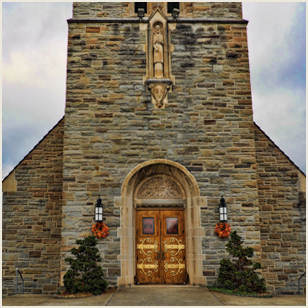Contemplation, Page: Quotes, Quote Topic
A heart that would contemplate must be bright as a mirror, shimmer like some still stretch of water crystal clear, so that in it and through it the mind may see itself, as in and through a mirror, an image in the image of God. The heart that covets the sight of God as in a mirror must keep itself free from cares, from harmful, unnecessary and even necessary ones. It must keep itself ever alert through reading, meditation and prayer. “Blessed are the pure of heart; they shall see God.” (Mt 5:8)
–Blessed Isaac of Stella (Twelfth Century)
Contemplation, Page: Quotes, Quote Topic
The saints do not contemplate to know, but to love. They do not love for the sake of loving but for the love of Him whom they love… For them, the end of ends is not to bring exultation to their intellect and nature and thus stop at themselves. It is to do the will of Another, to contribute to the good of the Good. They do not seek their own soul. They lose it.
–Jacques Maritain (1882–1973)
Augustine (354-430), Contemplation, Page: Quotes, Quote Author, Quote Topic
No person has a right to lead such a life of contemplation as to forget in one’s own ease the service due one’s neighbor; nor has any person a right to be so immersed in active life as to neglect the contemplation of God.
–Saint Augustine (354-430)
Contemplation, Meister Eckhart (1260-1328), Page: Quotes, Quote Author, Quote Topic
What we plant in the soil of contemplation, we shall reap in the harvest of action.
–Meister Eckhart (1260-1328)
Contemplation, Cross, Page: Quotes, Quote Topic
There is no higher contemplation than that of the Passion of Jesus Christ, and whoever has a devotion to it will not be lost, with the help of Jesus Christ.
–Saint John of God (1495-1550)
Contemplation, John of the Cross (1542-1591), Page: Quotes, Quote Author
The traits of the solitary bird are five: first, it seeks the highest place; second, it withstands no company; third, it holds its beak in the air; fourth, it has no definite color; fifth, it sings sweetly. These traits must be possessed by the contemplative soul. It must rise above passing things, paying no more heed to them than if they did not exist. It must likewise be so fond of silence and solitude that it does not tolerate the company of another creature. It must hold its beak in the air of the Holy Spirit, responding to his inspirations, that by so doing it may become worthy of his company. It must have no definite color, desiring to do nothing definite other than the will of God. It must sing sweetly in the contemplation and love of its Bridegroom.
–Saint John of the Cross (1542-1591)

